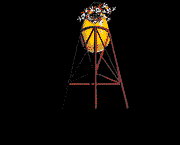Below are a collection of games, puzzles, things to ponder, and just some things for entertainment and amusement. Please enjoy!

|
The sentence "Buffalo buffalo Buffalo buffalo buffalo buffalo Buffalo buffalo." is a real sentence. To achieve this, it has three different meanings/uses of the word "buffalo." They are: 1) adjective: relating to the city of Buffalo, New York. Let's first parse the sentence: The sentence means "The bison from Buffalo confuse other bison from Buffalo who confuse the bison from Buffalo." This is a very difficult sentence for several reasons: Let's go step-by-step: Then add the adjectives that tell you where the bison are from: bison from the city of Buffalo. Finally, you add the trickiest partóa restrictive clause in the middle that tells you the first group of New York bison are themselves tricked by bison from the same town. Remember, a restrictive clause (or essential clause) is an adjective clause that is essential to the meaning of a sentence because it limits the thing it refers to. Yet because restrictive clauses are essential, they are not set off by commas. This is why there is no punctuation. Letís keep going: Or look at it this way: Let's tighten it up: Or maybe this way works for you? |
